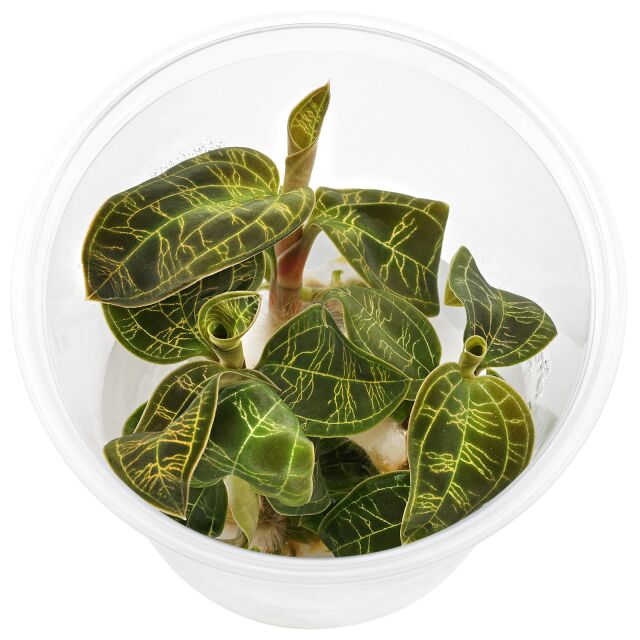Jewel Orchid



Macodes petola
Jewel Orchid
- Orchid from the shady rainforests of Southeast Asia
- Impressive glossy leaves
- Light green to deep dark green colour with white veins
- Develops velvety leaf surfaces
Item question
We’re here for you!
Please enter your question and e-mail and we’ll contact you as soon as possible. It usually takes us up to 24 hours during business days to respond.
Thank you for your question!
Thank you, we’ll get in touch!
Close window
You already sent us a question.
Please wait a few minutes
Description
The Macodes petola, also known as the Jewel Orchid, is an impressive plant renowned for its shiny, decorative leaves. This small, ground-dwelling orchid is native to the moist, shady rainforests of Southeast Asia, widely spread in countries like Thailand and Malaysia.
The leaf coloring of Macodes petola is particularly striking. The leaves exhibit a light green to deep, dark green hue with a unique, glittering vein structure in white. The leaves, which can reach a diameter of 3 to 5 cm, are arranged in a spiral pattern around the stems. The plant occasionally produces a flower spike, which can reach up to 25 cm in height, with individual flowers being small and in shades of brown-red or white. After the flowering has faded, the corresponding shoot gradually dies off, and new shoots develop, growing again to flowering size.
Cultivating Macodes petola requires a mix of orchid bark and sphagnum moss to create a loose substrate. However, Macodes also grows in other loose substrates and can be directly planted in sphagnum moss. This plant thrives with constant high humidity, making it excellently suited for use in terrariums and other plant containers. The plant containers do not necessarily need to be covered. For plants originating from in vitro culture, the Macodes should be given a transition period with a covered plant container to acclimate to the slightly drier environment. When watering, it is essential to ensure that the soil is thoroughly watered, then allowed to dry slightly before watering again. The soil should never completely dry out. The Macodes petola prefers consistently warm temperatures and should not be exposed to temperatures below 15 °C.
The Jewel Orchid is known for its ability to form dense, impressive mats in terrariums. The leaves with their reflective veins give the plant its name and make it an attractive highlight in any terrarium or plant container.
Profile
| Macodes petola | |
| Cultivation possibilities | In a mix of orchid bark and sphagnum moss or other loose substrates; can also be planted directly in moss. Suitable for terrariums, not necessarily covered, except for plants from in vitro culture during the acclimatisation phase. |
| Substrate | Loose substrate of orchid bark and sphagnum moss or similar loose substrates, allowing for good root growth and facilitating watering. |
| Watering | Water thoroughly and allow to slightly dry out before watering again; the soil should never completely dry out. |
| Air humidity | Constantly high, ideal for growth in terrariums. |
| Light requirement | Mimic the moist, shady conditions of Southeast Asian rainforests; bright, but indirect lighting preferred. |
| Temperature | Consistently warm, not below 15°C; optimal conditions for growth and flowering. |
| Flowering | Occasional inflorescence up to 25 cm in height; flowers are small, in shades of brown-red or white. |
| Special features | Forms dense, impressive mats in terrariums; the glittering veins of the leaves are particularly decorative. |
| Cultivation possibilities |
| In a mix of orchid bark and sphagnum moss or other loose substrates; can also be planted directly in moss. Suitable for terrariums, not necessarily covered, except for plants from in vitro culture during the acclimatisation phase. |
| Substrate |
| Loose substrate of orchid bark and sphagnum moss or similar loose substrates, allowing for good root growth and facilitating watering. |
| Watering |
| Water thoroughly and allow to slightly dry out before watering again; the soil should never completely dry out. |
| Air humidity |
| Constantly high, ideal for growth in terrariums. |
| Light requirement |
| Mimic the moist, shady conditions of Southeast Asian rainforests; bright, but indirect lighting preferred. |
| Temperature |
| Consistently warm, not below 15°C; optimal conditions for growth and flowering. |
| Flowering |
| Occasional inflorescence up to 25 cm in height; flowers are small, in shades of brown-red or white. |
| Special features |
| Forms dense, impressive mats in terrariums; the glittering veins of the leaves are especially decorative and create a striking colour accent in any terrarium or planting vessel. |
Terrarienpflanzen
Our terrarium plants give every terrarium an individual, natural atmosphere and at the same time provide a healthy environment for all terrarium inhabitants. Our wide range of tropical, subtropical and even arid plants are easy to combine and enhance any terrascape. Whether it's strong succulents, subtle tillandsias, eye-catching neoregelias or wonderful orchids - we offer terrarium plants for different terrascapes from rainforest to desert.
General information
| Item no. |
|
| EAN | |
| Weight | 0,05 kg |
| Shipping weight | 0,07 kg |
Customers ask customers
You have questions about this product? Ask other customer or our support team about this product!